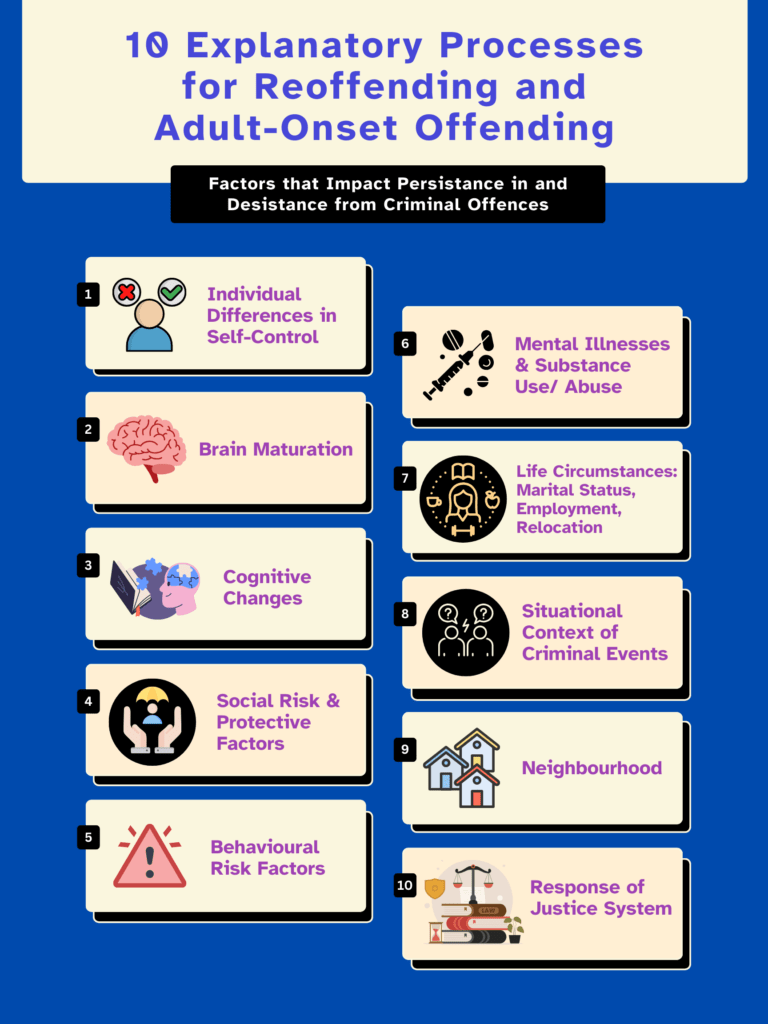Should Canada’s Youth Justice System Apply to Offenders Beyond 18 Years of Age?
The Youth Criminal Justice Act (YCJA), a law that governs the youth justice system of Canada, applies to youth who are alleged to have committed criminal offences. The term ‘youth’ refers to young persons who are at least 12 but under 18 years of age. The YCJA was enforced more than 20 years ago, in 2003, to address the shortcomings of the previous legislation and to establish a comprehensive legislative framework for a more effective youth justice system and to reduce reoffending rates, with a renewed and special focus on rehabilitation and reintegration of young persons into the communities upon release.
However, the rigid applicability of the youth justice system to young offenders under 18 years and any offenders older being subject to the adult criminal code often undermines the impact of sociological concepts, psychological development and living circumstances of emerging young adults (18 to 24 years) on desistance.
Using Role Transitions to Define Youth
A report by Universität Greifswald’s Department of Criminology, highly acclaimed for research and specialized expertise on how criminal justice systems throughout the world respond to crimes committed by young adults, reveals that there are four role transitions that must be accomplished before the phase of ‘youth’ can be considered to be over:
- Employment
- Entering a stable relationship with a partner/ spouse or detachment from parents by establishing a family of their own
- The capacity to assume an independent role of a consumer in an economy
- Participation in social affairs
According to sociological and psychological theory, these role transitions initiate individuation and the development of personal identity. The completion of these transitions decreases the possibility of engaging in crime by increasing sources of control over ourselves and our behaviour. It also asserts that new social roles, increased social inclusion, improved economic standing and stable employment make it easier to fulfill desires and goals in a legal manner, which makes illegal means less attractive. But, according to data from Statistics Canada on marriage, childbirth and post-secondary education, an emerging young adult in the 21st century is more likely to achieve these role transitions much later in their lives (probably in their late 20s), which leaves offenders in this age group at higher risk of repeat offending of more serious crimes.
Brain Maturation in Young Adults
Rolf Loeber, a distinguished psychologist and criminologist specializing in the study of juvenile delinquency, defines ten explanatory processes for both, persistence in and desistance from offending, and adult-onset offending during the phase of young adulthood. Brain maturation is second on his list of processes. This notion is reflected in the provisions of the Declaration of Principle in the YCJA too, which emphasizes that the youth justice system must accommodate the fact that young people lack maturity. But this stance is seemingly overturned in when the offender is a young adult of 18 to 24 years.
 Besides, numerous neuroscientific studies reveal that the human brain is still under development up to the age of 25 (possibly even beyond) and does not reach full maturity until at least the mid-20s. The prefrontal cortex, the area in the brain associated with problem-solving, emotional regulation, and calibrating risk and reward, is still developing in a young adult. These insights provide strong arguments in favour of a criminal justice system that deals with young adult offenders in a manner that is similar to the correctional methods accorded to juveniles in the justice system.
Besides, numerous neuroscientific studies reveal that the human brain is still under development up to the age of 25 (possibly even beyond) and does not reach full maturity until at least the mid-20s. The prefrontal cortex, the area in the brain associated with problem-solving, emotional regulation, and calibrating risk and reward, is still developing in a young adult. These insights provide strong arguments in favour of a criminal justice system that deals with young adult offenders in a manner that is similar to the correctional methods accorded to juveniles in the justice system.
Criminal Justice System for Young Adults in Selected Countries
In Germany, young adults have been integrated into the youth justice system since 1953. A reform of the law extended the scope of juvenile courts to incorporate young adults between the ages of 18 to 21. Specialized youth courts impose sanctions that may include educational measures, like community service, restorative practices or social training interventions to improve social skills, and youth sentences. The youth who receive a sentence can be sent to a youth custody facility until they are 24 years of age. Furthermore, the youth custody system offers a wider range of educational and vocational training to meet the learning and developmental needs of individual offenders. The benefits of accommodating young adult offenders in youth facilities rather than with adults are reflected in the lower reoffend rates. Amongst the German youth (aged 14-24 years) released from a youth custody facility, about 35% reoffend within three years. It is a much lower number in comparison to the 50% reoffend rate in Canada, with federal offenders younger than 25 having the highest rate of reoffending and of violent reoffending.
In Austria, provisions of the youth justice system apply to young adults and special assessments and investigations are made into the offender’s personality, living conditions to ensure sentences are appropriate to each individual case. Additionally, young adults under the age of 22 can be placed in juvenile detention centers and can remain there until they turn 27. These centers offer opportunities for education and training, which young adult offenders often miss out on in adult facilities.
In the Netherlands, proposed amendments were introduced in 2014 to impose the sanctions of juvenile law to young adults aged 18 to 23, making it the only European country to extend juvenile justice provisions to such a high age. The acceptance of these amendments was highly influenced by the wide research into the biological and psychological development of young adults.
The well-being of young adults seems to be overlooked in the current youth justice system of Canada, with little to no accommodations to address the biological psychological development processes they are undergoing in this stage of life. There is a distinct need for effective reforms in how youth justice systems respond to crimes committed by young adults, especially when young adult offenses closely resemble juvenile offending than adult crimes. Canada should consider extending the scope of the youth justice system to ensure offenders in their early 20s can benefit from more individualized interventions and easy reintegration into their communities upon release.
Check out the links below to learn more about youth justice system in Canada:
Ontario’s Youth Justice System
Rights and Responsibilities of Youth Offenders


7 Comments
They are still young and innocent
we all need a second chance
Well, glad to read such compelling content towards supporting and recognizing to adopt youth offenders back into the normal society where they actually belong so they can overcome the pasts and lead a better life to make positive changes for themselves and for others in their lives.
Hope this article reaches not only the Canadian justice system but also the countries where it’s highly required to put in practice.
Keep up the good work, Author Sadaf.
Very good initiative and thoughts, may Allah bless you and your family with good health, peace, happiness and vision for achieving the best…
“Ms Sadaf Sheik’s article on the extension of Canada’s youth justice system beyond age 18 offers a compelling exploration of international approaches to young offenders. Her insights into the complexities of youth crime and rehabilitation are thought- provoking and contribute meaningfully to the ongoing discussion on criminal justice reform”
Well researched and well written article highlighting intricacies of youth issues. The author is successful in stressing the need to discuss and push forward the much needed reforms. I see a sign of harbinger!
The topic is worth considering. This article is highly informative, well-researched, and convincingly supports the topic
Add Comment